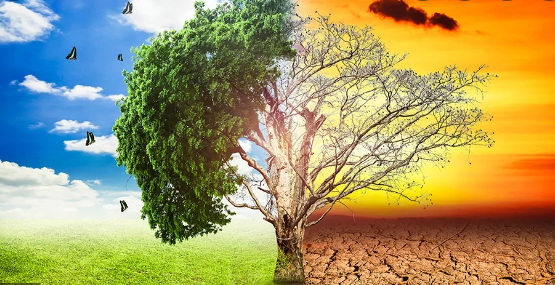What is Global Warming, Definitions and its Effects
From chronic droughts in sub-Saharan Africa to tropical storms in Southeast Asia, the Caribbean, and the Pacific, millions of people are experiencing the dire effects of climate change-induced disasters. In 2021, extreme heat caused deadly heat waves in Canada and Pakistan, as well as wildfires in Greece and Siberia. Madagascar, Germany, and China are experiencing severe flooding due to global warming; A very long and severe drought pushed a million people to the brink of the first “climate famine”.
What is Global Warming?
Global warming is the observed long-term increase in global temperature since pre-industrial times (between 1850 and 1900) due to human activities, mainly the burning of fossil fuels, which reduces the number of greenhouse gases on Earth. The air holds heat. The term “climate change” cannot be transferred.
Nine of the 10 warmest years since 1880 have been since 2005 – and 5 since 2015. Climate change critics have called for a “stop” or a “slow”. Global warming, but a lot of research contradicts that, including a 2018 article in the journal Environmental Research. Global warming has a negative effect on people around the world.
Climate scientists now conclude that global warming must reach 1.5 degrees Celsius by 2040: the biggest and most serious threat to daily life around the world Disasters: extreme droughts, forest fires, floods, hurricanes, and other disasters that we call. this one. The weather is changing.
Everyone will feel these effects in one way or another, but they will be especially felt by the poor, minorities, and people of color because climate change is a leading cause of poverty, displacement, hunger, and social unrest.
Also Read:
- What is an Environmental health and safety?
- Environmental Conservation
- What is Plastic Pollution? its Causes and Effects
- What is Recycling_ Process of Recycling
What is Climate Change?
Climate change in the region It is the long-term changes in the average climate that define the landscape on a regional and global scale. These variables have many visible effects depending on the word.
in particular, the combustion of fossil fuels; Climate change, especially since the mid-twentieth century, has led to an increase in greenhouse gases in the earth’s atmosphere and an increase in the average temperature of the earth’s surface. Natural processes influenced by human activities contribute to climate change, including internal variability.
Causes of Global Warming
Global warming occurs when carbon dioxide (CO2) and other pollutants build up in the atmosphere and absorb sunlight and sunlight. Normally, this radiation escapes into space, but these pollutants can remain in the atmosphere for years and centuries, trapping heat and warming the planet. in particular carbon dioxide; methane nitrous oxide; chemicals in water vapor, and fluorine are known as greenhouse gases and cause global warming.
Natural cycles and fluctuations have changed Earth’s climate many times over the past 800,000 years, but our current global warming is directly caused by human activities, especially coal. Oil burns fossil fuels like gasoline and gas. It causes the greenhouse effect. The leading source of greenhouse gases in the United States is transportation (29%); power generation (28%) and industry (22%).
To avoid catastrophic climate change, deep emissions must be reduced and fossil fuels replaced worldwide. The good news is that countries around the world have made formal commitments to reduce their emissions under the 2015 Paris Climate Agreement by setting new standards and developing new policies that meet or exceed those standards. The bad news is that we can’t work fast enough.

Scientists plan to avoid the worst impacts of climate change by 2030. And for this to happen, the international community must take immediate and concrete steps to decarbonize electricity in a balanced way and move from fossil fuel-based generation to renewable energy sources such as wind and solar. . to power our cars and trucks; our facilities; Improve energy efficiency in public services and industry.
Effects of Global Warming
There are some effects of Global Warming:
- Every year scientists learn more about the effects of global warming, and every year we discover new evidence of its devastating effects on people and the planet.
- As heat waves, droughts, and floods related to climate change become more frequent and severe, communities will suffer and the death toll will rise.
- Scientists estimate that if we don’t reduce our emissions, climate change could kill more than 250,000 people worldwide and push 100 million into poverty by 2030.
- Global warming is already affecting the United States. And if we can’t get our emissions under control, here’s something to look forward to:
- Disappearing glaciers, previous snowmelt, and severe droughts are causing severe water shortages and increasing the risk of wildfires in the American West.
- Sea level rise will lead to more flooding along the east coast, especially in Florida and elsewhere in the Gulf of Mexico.
- Forests, farms, and cities face new challenges with plagues, heat waves, heavy rainfall, and flooding. All of these can harm or destroy agriculture and fisheries.
- Disruption of habitats such as coral reefs and alpine meadows can lead to the extinction of many plant and animal species.
- As the pollen-producing ragweed continues to grow, outbreaks of allergies, asthma, and infectious diseases are common due to high levels of air pollution and conditions that promote the spread of viruses and parasites.